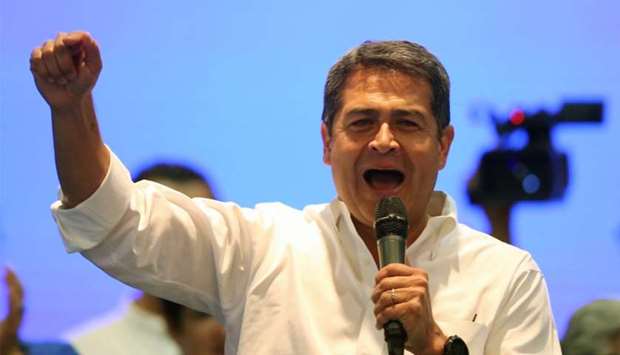Honduran President Juan Orlando Hernandez, a center-right US ally, declared victory in the Central American nation's election on Sunday, but a lack of official results hours after the vote ended irked his key rival who also claimed to be winning.
A poll released by network Televicentro, generally considered a reliable indicator of results, gave President Juan Orlando Hernandez 43.93 percent of the vote, with Salvador Nasralla, who leads a broad left-right coalition called the Opposition Alliance Against the Dictatorship, at 34.70 percent.
‘The count is more than clear and resounding that we won this election,’ Hernandez told supporters earlier in the evening at a Tegucigalpa hotel. ‘That is what the polls say and that is what the results we are seeing from the count are saying.’
But with no official results nearly eight hours since voting stations closed, a top Mexican diplomat described the situation in the poor, violence-plagued nation as ‘tense.’ Accusations of electoral fraud are common in Central American elections and have been known to spark violent protests.
The opposition alliance said early numbers gave it a strong lead but added it would only accept physically counted ballots.
‘We are winning,’ Nasralla told a subdued group of supporters.
Hernandez's bid for a second term was strongly opposed by other parties, not least because eight years ago, while a lawmaker, he supported a coup that removed an earlier president after he proposed a referendum on re-election.
FIGHT AGAINST GANGS
Hernandez, 49, is popular, however, for lowering a sky-high murder rate, accelerating economic growth and cutting the deficit since he took office in 2014 in one of the Americas' poorest countries.
Hernandez, long the favorite, was allowed to run for another term thanks to a 2015 Supreme Court decision that overturned a constitutional ban on re-election.
Critics warn that Hernandez, a staunch US ally on fighting drug gangs and migration, is tightening his grip on power and used a pliant Supreme Court and electoral tribunal to clear a path for his re-election bid.
Born into a rural family of 17 siblings, Hernandez promises to use a second term to strengthen his militarized assault on gangs, to build roads and bridges with public and private money to lure foreign investment, create 600,000 jobs and help lift economic growth to above 6 percent.
In the capital, Tegucigalpa, many were thankful for a lower crime rate and seem willing to overlook Hernandez's consolidation of power.
‘Better the devil you know than the devil you don't,’ said Ada Solorzano, a 57-year-old nurse, of Hernandez. ‘During his time in office, he's fought the gangs and the drug traffickers and he's improved the employment situation. We know he will continue the war on crime and that he plans to create more work.’
Another Tegucigalpa resident, Klenia Corea, 26, said she, her family and friends were all voting for Nasralla, citing a lack of jobs for young people and the president's grip on law enforcement.
‘He's got all the police,’ said Corea's mother, Yadira Salgado, 61. ‘He's got it all tied up.’

